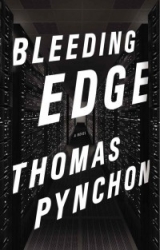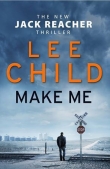
Текст книги "Bleeding Edge"
Автор книги: Thomas Pynchon
Жанры:
Роман
,сообщить о нарушении
Текущая страница: 31 (всего у книги 31 страниц)
OK, Maxine thinks, he raises a hand, time for the Beretta.
He raises a hand. Tallis avoids it easily, but the Tomcat is now in the equation.
“It doesn’t happen,” Ice carefully watching the muzzle.
“How’s that, Gabe.”
“I don’t die. There’s no scenario where I die.”
“Batshit fuckin insane,” March out the car window.
“Better hop on in there with your mom, Tallis. Gabe, that’s good to hear,” Maxine calm and upbeat, “and the reason you don’t die? is that you come to your senses. Start thinking about this on a longer time scale and, most important, walk away.”
“That’s—”
“That’s the scenario.”
The odd thing about March’s street is that it would be rejected by any movie-location scout, regardless of genre, as too well behaved. In this fold of space-time, women accessorized like Maxine do not point sidearms at people. It must be something else in her hand. She’s offering him something, something of value he doesn’t want to take, wants to pay him back a debt maybe, which he’s pretending to forgive and will eventually accept.
“She forgot the part,” March can’t help hollering out the window, “where you don’t get to be master of the universe, you go on being a schmuck, all kinds of competition starts coming out of the woodwork and you have to scramble to not lose market share, and your life stops being your own and belongs to the overlords you always worshipped.”
Poor Gabe, he has to stand here at gunpoint and be lectured by his ex-mother-in-law-to-be, a forever-unreconstructed lefty yet.
“You guys gonna be all right?” calls Gunther. “I had tickets to Mamma Mia, it’s nearly curtain time, I can’t even scalp em now.”
“Try calling it a travel and entertainment deduction anyway, Gunther. And you be nice to him too,” Maxine warns Ice as he carefully backs away and gets in his limo. She waits till the elongated vehicle has made it to the corner and turned, slides behind the wheel of the Impala, cranks up the radio, which is in the middle of a Tammy Wynette set from someplace across the river, and proceeds cautiously crosstown.
“We better assume he saw your plates,” sez March.
“Means an all-points bulletin.”
“Killer drones, more likely.”
“Precisely why,” Maxine wrestling the power-steering-challenged monster up and down a number of underlit streets, “we’re going to keep off bridges, out of tunnels, stay right here in town, and go hide in plain sight.”
Which after a scenic spin against a deep panorama of lights down and up the West Side Highway, turns out to be Warpspeed Parking again. Glancing up in the mirror, still empty of anything but the night street, “OK if I take it down myself, Hector? You didn’t see us, right?”
“D and D, mami.”
Winding forever down into regions of older and more dilapidated brickwork, corroded from generations of car emissions. The Impala’s exhaust comes into its own, like a teen vocalist in a high-school boys’ room.
March lights a joint and after a while, paraphrasing Cheech & Chong, drawls, “I woulda shot him, man.”
“You heard what he said. I think this is in his contract with the Death Lords he works for. He’s protected. He walked away from a loaded handgun, that’s all. He’ll be back. Nothing’s over.”
“You think he meant all that about getting Kennedy away from me?” Tallis quavers.
“Might not be that easy. He’ll keep running cost-benefit workups and find that there’s too many people coming at him from too many different directions, the SEC, the IRS, the Justice Department, he can’t buy them all off. Plus competitors friendly and otherwise, hacker guerrillas, sooner or later those billions will start to dwindle, and if he has any sense, he’ll pack up and split for someplace like Antarctica.”
“I hope not,” sez March, “global warming’s not bad enough? The penguins—”
Maybe it’s this Luxury Lounge interior—forty years down the road with the not-yet-damped vibrations of Midwest teen fantasies that’ve worked their way into the grain of the metallic turquoise vinyl, the loop-carpet floor mats, the ashtrays overflowing with ancient cigarette butts, some with lipstick shades not sold for years, each with a history of some romantic vigil, some high-speed pursuit, whatever Horst saw in this rolling museum of desire when he answered the ad in the Pennysaver back whenever it was, set and setting, as Dr. Tim always liked to say, now, presently, has wrapped them, brought them in from the unprofitable drill-fields of worry about the future, here inside, to repose, to unfurrowing, each eventually to her own dreams.
Next thing anybody knows, it’s morning. Maxine is slouched across the front seat, and March and Tallis are waking up in back, and everybody feels creaky.
They ascend to the street, where once again, overnight, all together, pear trees have exploded into bloom. Even this time of year, there could still be snow, it’s New York, but for now the brightness in the street is from flowers on trees whose shadows are texturing the sidewalks. It’s their moment, the year’s great pivot, it’ll last for a few days, then all collect in the gutters.
The Piraeus Diner is coming off another overnight of dope-scourged hipsters, funseekers who have failed to hook up, night owls who’ve missed the last trains back to the suburbs. Refugees from the sunless half of the cycle. Whatever it was they thought they needed, coffee, a cheeseburger, a kind word, the light of dawn, they’ve kept watch, stayed awake and caught sight of it at least, or nodded off and missed it once again.
Maxine has a quick cup of coffee and leaves March and Tallis with a tableful of breakfast to revisit their food issues. Heading back to the apartment to pick up the boys and see them to school, she notices a reflection in a top-floor window of the gray dawn sky, clouds moving across a blear of light, unnaturally bright, maybe the sun, maybe something else. She looks east to see what it might be, but whatever it is shining there is still, from this angle, behind the buildings, causing them to inhabit their own shadows. She turns the corner onto her block and leaves the question behind. It isn’t till she’s in the elevator of her building that she begins to wonder, actually, whose turn it is to take the kids to school. She’s lost track.
Horst is semiconscious in front of Leonardo DiCaprio in “The Fatty Arbuckle Story,” and does not look street-ready. The boys have been waiting for her, and of course that’s when she flashes back to not so long ago down in DeepArcher, down in their virtual hometown of Zigotisopolis, both of them standing just like this, folded in just this precarious light, ready to step out into their peaceable city, still safe from the spiders and bots that one day too soon will be coming for it, to claim-jump it in the name of the indexed world.
“Guess I’m running a little late, guys.”
“Go to your room,” Otis shrugging into his backpack and out the door, “you are, like, so grounded.”
Ziggy surprising her with an unsolicited air kiss, “See you later at pickup, OK?”
“Give me a second, I’ll be right with you.”
“It’s all right, Mom. We’re good.”
“I know you are, Zig, that’s the trouble.” But she waits in the doorway as they go on down the hall. Neither looks back. She can watch them into the elevator at least.
ABOUT THE AUTHOR
THOMAS PYNCHON is the author of V., The Crying of Lot 49, Gravity’s Rainbow, Slow Learner, a collection of short stories, Vineland, Mason & Dixon, Against the Day, and, most recently, Inherent Vice. He received the National Book Award for Gravity’s Rainbow in 1974.








